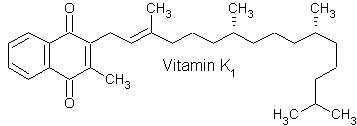Vitamins are substances that play an essential role in human metabolic processes, but which human cannot synthesize (except vitamin D). Small amounts of vitamins are essential for the regulation of all bodily processes. Vitamins must be obtained from the food on a daily basis. A person's diet must provide all the necessary vitamins. In their absence people develops certain deficiency diseases or other abnormal conditions.

|
| Figure. Vitamin K Struture |
Vitamin K include Vitamin K1 and Vitamin K2 with similar chemical structure. Vitamin K is involved in the carboxylation of certain glutamate residues in proteins to form gamma-carboxyglutamate residues. Gla-residues are usually involved in binding calcium. The Gla-residues are essential for the biological activity of all known Gla-proteins. Generally, vitamin K is thought related with blood coagulation, new bone formation and vascular biology.
The deficiency of Vitamin K may cause massive, uncontrolled internal bleeding, cartilage calcification and severe malformation of developing bone, or deposition of insoluble calcium salts in the arterial vessel walls.
Foods contain large amount of Vitamin K include spinach, Broccoli, milk, eggs, cereals. Vitamin K was fat-soluble.
















